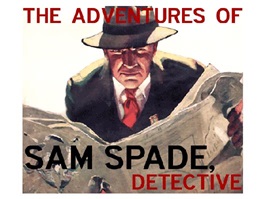
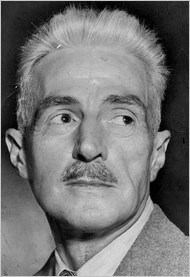 The Adventures of Sam Spade (1946-1951) aired “The S. Q. P. Caper” on November7, 1948 as its 124th episode of approximately 243, only 74 of which are estimated to be still in circulation (this includes 12 AFRS repeats and 2 rehearsal shows). We have previously aired only seven episodes of this show, the first in 2018, and the sixth just over a year ago in March of 2024. For newcomers, and as a refresher for long time listeners, we reprise the historical notes about the origins of Sam Spade as presented for background to that initial episode, with additional material added on the amazing Lurene Tuttle.
The Adventures of Sam Spade (1946-1951) aired “The S. Q. P. Caper” on November7, 1948 as its 124th episode of approximately 243, only 74 of which are estimated to be still in circulation (this includes 12 AFRS repeats and 2 rehearsal shows). We have previously aired only seven episodes of this show, the first in 2018, and the sixth just over a year ago in March of 2024. For newcomers, and as a refresher for long time listeners, we reprise the historical notes about the origins of Sam Spade as presented for background to that initial episode, with additional material added on the amazing Lurene Tuttle.
Sam Spade was the private detective and creation of Dashiell Hammett (1894-1961, photo top right). Based on Hammett’s time as a Pinkerton detective from people he knew or had heard about, Spade first appeared in the third of Hammett’s five novels, The Maltese Falcon, in 1930. Only three other stories, all short works, would feature Spade in magazines and all appeared in 1932. One final Spade story was published in 2013, over 50 years after his death in 1961. The Maltese Falcon was brought to film three times: 1931, 1936, and the now film noir classic of 1941 starring Humphrey Bogart, Peter Lorre, Mary Astor, and Sydney Greenstreet.
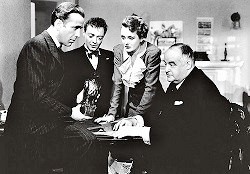
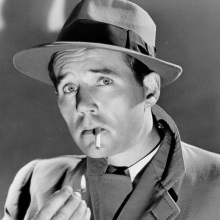 For all but its final radio season Howard Duff (1913-1990, photo at right) would star as Sam Spade and Lurene Tuttle would co-star as Spade’s secretary Effie Perrine. Duff would go on in later years to play various roles in quite a few films, and later with the advent of television would enjoy a lengthy career in many shows as star or character actor (drama and detective primarily) and was an easily recognizable presence on both the silver and small screens. Like Spade’s creator in the late 1940s (pre-HUAC, but Hammett failing to answer a Congressional Committee’s questions under oath stemming from his overt communist dealings), but years later and owing to a different set of circumstances, Duff found himself in the crosshairs of the early 1950s McCarthy-era House Unamerican Activities Committee (HUAC) and was labeled a communist subversive. It was at this point that this soft “blackballing” dovetailed with his burgeoning tv and film career that made it advantageous for him to leave the radio series, at which point Stephen Dunne would take over as the voice of Sam Spade for the series’s final 1950-51 season. According to the writeup by Radio Spirits on their 2014 calendar, on which Duff has the November slot: “A lot of talent came out of the Armed Forces Radio Service at the conclusion of the Second World War. One of the most outstanding examples was an energetic young sergeant named Howard Duff, born on November 24, 1913. A staff announcer for many AFRS features during the war, he was ready for the big time as soon as he doffed the uniform. It didn’t take long for him to land the role of a lifetime, bringing Dashiell Hammett’s legendary private eye Sam Spade to the microphone. In his four years in the role, Duff did the impossible–he replaced Humphrey Bogart’s film version as the definitive embodiment of the Hammett character: tough, yet vulnerable; hardboiled, yet with a sense of humor about his weekly predicaments. Among the legions of postwar radio detectives, Duff’s Spade stood out as one of the few truly originals.”
For all but its final radio season Howard Duff (1913-1990, photo at right) would star as Sam Spade and Lurene Tuttle would co-star as Spade’s secretary Effie Perrine. Duff would go on in later years to play various roles in quite a few films, and later with the advent of television would enjoy a lengthy career in many shows as star or character actor (drama and detective primarily) and was an easily recognizable presence on both the silver and small screens. Like Spade’s creator in the late 1940s (pre-HUAC, but Hammett failing to answer a Congressional Committee’s questions under oath stemming from his overt communist dealings), but years later and owing to a different set of circumstances, Duff found himself in the crosshairs of the early 1950s McCarthy-era House Unamerican Activities Committee (HUAC) and was labeled a communist subversive. It was at this point that this soft “blackballing” dovetailed with his burgeoning tv and film career that made it advantageous for him to leave the radio series, at which point Stephen Dunne would take over as the voice of Sam Spade for the series’s final 1950-51 season. According to the writeup by Radio Spirits on their 2014 calendar, on which Duff has the November slot: “A lot of talent came out of the Armed Forces Radio Service at the conclusion of the Second World War. One of the most outstanding examples was an energetic young sergeant named Howard Duff, born on November 24, 1913. A staff announcer for many AFRS features during the war, he was ready for the big time as soon as he doffed the uniform. It didn’t take long for him to land the role of a lifetime, bringing Dashiell Hammett’s legendary private eye Sam Spade to the microphone. In his four years in the role, Duff did the impossible–he replaced Humphrey Bogart’s film version as the definitive embodiment of the Hammett character: tough, yet vulnerable; hardboiled, yet with a sense of humor about his weekly predicaments. Among the legions of postwar radio detectives, Duff’s Spade stood out as one of the few truly originals.”
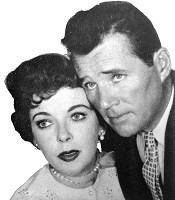 Duff would marry one of the most respected and groundbreaking women actors and directors in film history in 1951, Ida Lupino (1918-1995, Lupino & Duff photo at right). The two would star together in several films throughout the 1950s. As to Duff’s film and television appearances, they are too numerous to mention all of them here, though a sampling may recall him to many a fan of the films and TV shows in which he appeared: Films–The Naked City (1948), While the City Sleeps (1956, with Ida Lupino), and Kramer vs. Kramer (1979); Television–The Rockford Files, The Golden Girls, Knots Landing, Dallas, as “Capt.” Thomas Magnum, II–grandfather of Thomas Magnum starring Tom Selleck on Magnum, P.I. His genre credits include an episode of The Twilight Zone and Batman (“The Entrancing Dr. Cassandra” with Ida Lupino).
Duff would marry one of the most respected and groundbreaking women actors and directors in film history in 1951, Ida Lupino (1918-1995, Lupino & Duff photo at right). The two would star together in several films throughout the 1950s. As to Duff’s film and television appearances, they are too numerous to mention all of them here, though a sampling may recall him to many a fan of the films and TV shows in which he appeared: Films–The Naked City (1948), While the City Sleeps (1956, with Ida Lupino), and Kramer vs. Kramer (1979); Television–The Rockford Files, The Golden Girls, Knots Landing, Dallas, as “Capt.” Thomas Magnum, II–grandfather of Thomas Magnum starring Tom Selleck on Magnum, P.I. His genre credits include an episode of The Twilight Zone and Batman (“The Entrancing Dr. Cassandra” with Ida Lupino).
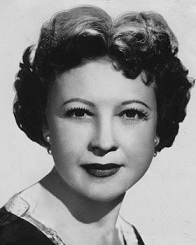
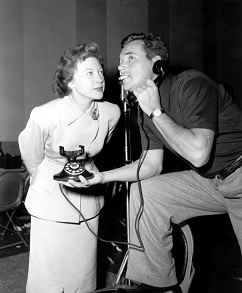 Lurene Tuttle (1907-1986) was known as “The First Lady of Radio,” sometimes appearing in 15 different shows a week. Dragnet, The Whistler, Lux Radio Theater, Suspense, and The Great Gildersleeve were but a scant few of the many shows she would appear in over the years. One of her most memorable roles was as Sam Spade’s secretary Effie Perrine. She also played virtually every other female character on the show as well, a tribute to her immense talent and versatility. She transitioned from vaudeville to radio, and from radio to film and television, appearing in some 50 films (credited and uncredited), and dozens and dozens of television programs, a few of which were Leave it to Beaver, The Andy Griffith Show, Fantasy Island, Dennis the Menace, Little House on the Prairie, Bonanza, Gunsmoke, and I Dream of Jeannie. Lurene Tuttle was honored with two stars on the Hollywood Walk of Fame, one for radio and one for television. She died of cancer on May 28, 1986 in a hospital in Encino, California. Long time Sam Spade co-star Howard Duff delivered her eulogy.
Lurene Tuttle (1907-1986) was known as “The First Lady of Radio,” sometimes appearing in 15 different shows a week. Dragnet, The Whistler, Lux Radio Theater, Suspense, and The Great Gildersleeve were but a scant few of the many shows she would appear in over the years. One of her most memorable roles was as Sam Spade’s secretary Effie Perrine. She also played virtually every other female character on the show as well, a tribute to her immense talent and versatility. She transitioned from vaudeville to radio, and from radio to film and television, appearing in some 50 films (credited and uncredited), and dozens and dozens of television programs, a few of which were Leave it to Beaver, The Andy Griffith Show, Fantasy Island, Dennis the Menace, Little House on the Prairie, Bonanza, Gunsmoke, and I Dream of Jeannie. Lurene Tuttle was honored with two stars on the Hollywood Walk of Fame, one for radio and one for television. She died of cancer on May 28, 1986 in a hospital in Encino, California. Long time Sam Spade co-star Howard Duff delivered her eulogy.
What would the opening scene in a Sam Spade adventure be without a beautiful woman entering his office center stage and imploring Sam to help her? “The S. Q. P. Caper” is no different, except that Sam turns down the offer from the desperate dame to help her discover her husband in the arms of another. In short, a future divorce case. Explaining that he does not do divorce cases because they are more trouble than they are worth, Sam does the next best thing and calls a friend of his who is the in-house hotel private dick at the hotel where the woman’s husband is staying, and out sources the case to him. Problem solved. right? One would think so, except that no case is easy and this one proves in spades why Sam has sworn off handling them, for before long there has been a murder and the phone call from Sam’s detective friend now involves Sam after all. And a dandy little mystery it is, full of little surprises and unforeseen complications, all making for an entertaining half hour. And for good measure and quite apart from the primary murder mystery is the ongoing puzzle of just what the title’s initials…S. Q. P…. really stand for. Several preliminary guesses are put forth while the events of the main story are running their course, but not until the end of this caper do we learn their true meaning. A fun little touch that counter balances the serious tone carrying the rest of the story.
Play Time: 24:23
{This episode of Sam Spade aired on a Sunday evening in early November of 1948. After school the following afternoon the neighborhood gang could be found at the nearby newsstand looking for further detective adventures, and they would hit the jackpot. Black Mask (1920-50) by the end of its admirable run would be known as the finest detective pulp magazine ever published, its crowning glory coming perhaps with the serialization of Dashiell Hammett’s The Maltese Falcon beginning in its September 1929 issue. Black Mask was a bi-monthly in 1948. Crack Detective Stories (1938-57), as has been remarked here before, while producing a level of stories with enough variety and page-turning ability to hold its faithful audience for nearly two decades, was probably best remembered for its total of eight title changes than anything else. From November 1943 through September of 1949 it showcased the Crack Detective Stories moniker for all of 34 issues. Though a bi-monthly in 1948 it managed only 5 issues. Dime Detective (1931-53), according to a highly reputable website, “was the most popular of Popular Publication’s line of detective pulps and one of the company’s longest surviving titles.” It managed a whopping 274 issues (most of them monthly) with 1948 holding to that monthly schedule.}
[Left: Black Mask, 11/48 – Center: Crack Detective, 11/48 – Right: Dime Detective, 11/48]
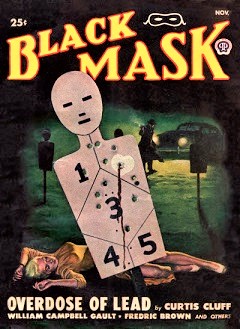
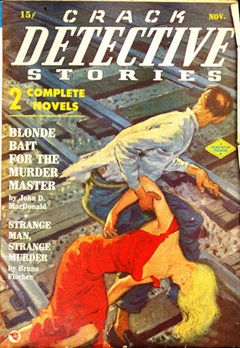
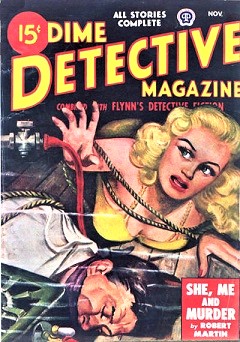
To view the entire list of Old Time Radio episodes at Tangent Online, click here.